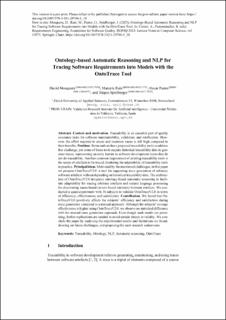Please use this identifier to cite or link to this item:
https://doi.org/10.21256/zhaw-30652| Publication type: | Conference paper |
| Type of review: | Peer review (publication) |
| Title: | Ontology-based automatic reasoning and NLP for tracing software requirements into models with the OntoTrace tool |
| Authors: | Mosquera Tobón, Jose David Ruiz, Marcela Pastor, Oscar Spielberger, Jürgen |
| et. al: | No |
| DOI: | 10.1007/978-3-031-29786-1_10 10.21256/zhaw-30652 |
| Proceedings: | Requirements Engineering: Foundation for Software Quality : REFSQ 2023 |
| Editors of the parent work: | Ferrari, Alessio Penzenstadler, Birgit |
| Page(s): | 140 |
| Pages to: | 158 |
| Conference details: | 29th International Working Conference on Requirements Engineering: Foundation for Software Quality (REFSQ), Barcelona, Spain, 17-20th April 2023 |
| Issue Date: | 1-Apr-2023 |
| Series: | Lecture Notes in Computer Science |
| Series volume: | 13975 |
| Publisher / Ed. Institution: | Springer |
| Publisher / Ed. Institution: | Cham |
| ISBN: | 978-3-031-29785-4 978-3-031-29786-1 |
| Language: | English |
| Subjects: | Traceability; Ontology; Automatic reasoning; OntoTrace; Natural language processing (NLP) |
| Subject (DDC): | 005: Computer programming, programs and data 410.285: Computational linguistics |
| Abstract: | Context and motivation. Traceability is an essential part of quality assurance tasks for software maintainability, validation, and verification. However, the effort required to create and maintain traces is still high compared to their benefits. Problem. Some authors have proposed traceability tools to address this challenge, yet some of those tools require historical traceability data to generate traces, representing an entry barrier to software development teams that do not do traceability. Another common requirement of existing traceability tools is the scope of artefacts to be traced, hindering the adaptability of traceability tools in practice. Principal ideas. Motivated by the mentioned challenges, in this paper we propose OntoTraceV2.0: a tool for supporting trace generation of arbitrary software artefacts without depending on historical traceability data. The architecture of OntoTraceV2.0 integrates ontology-based automatic reasoning to facilitate adaptability for tracing arbitrary artefacts and natural language processing for discovering traces based on text-based similarity between artefacts. We conducted a quasi-experiment with 36 subjects to validate OntoTraceV2.0 in terms of efficiency, effectiveness, and satisfaction. Contribution. We found that OntoTraceV2.0 positively affects the subjects’ efficiency and satisfaction during trace generation compared to a manual approach. Although the subjects’ average effectiveness is higher using OntoTraceV2.0, we observe no statistical difference with the manual trace generation approach. Even though such results are promising, further replications are needed to avoid certain threats to validity. We conclude the paper by analysing the experimental results and limitations we found, drawing on future challenges, and proposing the next research endeavours. |
| URI: | https://digitalcollection.zhaw.ch/handle/11475/30652 |
| Fulltext version: | Accepted version |
| License (according to publishing contract): | Licence according to publishing contract |
| Departement: | School of Engineering |
| Organisational Unit: | Institute of Computer Science (InIT) |
| Published as part of the ZHAW project: | Smart Hospital – Integrated Framework, Tools & Solutions (SHIFT) |
| Appears in collections: | Publikationen School of Engineering |
Files in This Item:
| File | Description | Size | Format | |
|---|---|---|---|---|
| 2023_Mosquera-etal_Ontology-based-automatic-reasoning_REFSQ_LNCS.pdf | Accepted Version | 985.96 kB | Adobe PDF |  View/Open |
Show full item record
Mosquera Tobón, J. D., Ruiz, M., Pastor, O., & Spielberger, J. (2023). Ontology-based automatic reasoning and NLP for tracing software requirements into models with the OntoTrace tool [Conference paper]. In A. Ferrari & B. Penzenstadler (Eds.), Requirements Engineering: Foundation for Software Quality : REFSQ 2023 (pp. 140–158). Springer. https://doi.org/10.1007/978-3-031-29786-1_10
Mosquera Tobón, J.D. et al. (2023) ‘Ontology-based automatic reasoning and NLP for tracing software requirements into models with the OntoTrace tool’, in A. Ferrari and B. Penzenstadler (eds) Requirements Engineering: Foundation for Software Quality : REFSQ 2023. Cham: Springer, pp. 140–158. Available at: https://doi.org/10.1007/978-3-031-29786-1_10.
J. D. Mosquera Tobón, M. Ruiz, O. Pastor, and J. Spielberger, “Ontology-based automatic reasoning and NLP for tracing software requirements into models with the OntoTrace tool,” in Requirements Engineering: Foundation for Software Quality : REFSQ 2023, Apr. 2023, pp. 140–158. doi: 10.1007/978-3-031-29786-1_10.
MOSQUERA TOBÓN, Jose David, Marcela RUIZ, Oscar PASTOR und Jürgen SPIELBERGER, 2023. Ontology-based automatic reasoning and NLP for tracing software requirements into models with the OntoTrace tool. In: Alessio FERRARI und Birgit PENZENSTADLER (Hrsg.), Requirements Engineering: Foundation for Software Quality : REFSQ 2023. Conference paper. Cham: Springer. 1 April 2023. S. 140–158. ISBN 978-3-031-29785-4
Mosquera Tobón, Jose David, Marcela Ruiz, Oscar Pastor, and Jürgen Spielberger. 2023. “Ontology-Based Automatic Reasoning and NLP for Tracing Software Requirements into Models with the OntoTrace Tool.” Conference paper. In Requirements Engineering: Foundation for Software Quality : REFSQ 2023, edited by Alessio Ferrari and Birgit Penzenstadler, 140–58. Cham: Springer. https://doi.org/10.1007/978-3-031-29786-1_10.
Mosquera Tobón, Jose David, et al. “Ontology-Based Automatic Reasoning and NLP for Tracing Software Requirements into Models with the OntoTrace Tool.” Requirements Engineering: Foundation for Software Quality : REFSQ 2023, edited by Alessio Ferrari and Birgit Penzenstadler, Springer, 2023, pp. 140–58, https://doi.org/10.1007/978-3-031-29786-1_10.
Items in DSpace are protected by copyright, with all rights reserved, unless otherwise indicated.